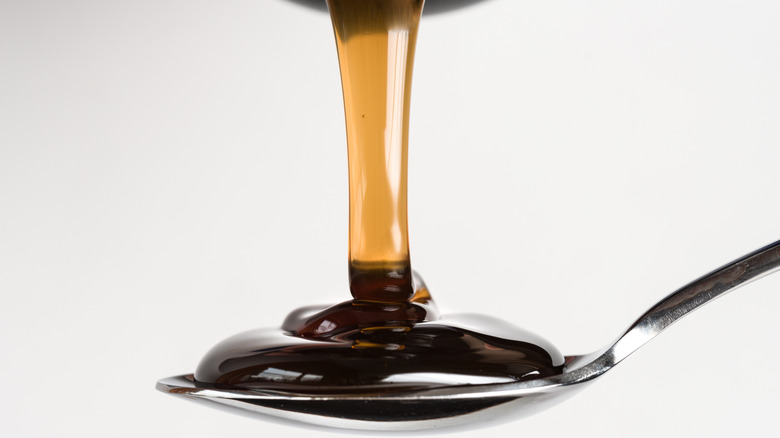What Is High Fructose Corn Syrup And Is It Bad For You?
High fructose corn syrup (HFCS) has found its way into almost all foods, especially processed foods at the grocery store like baked goods, sugary snacks, fake maple syrup, some cereals, and sodas. You may have heard something about high fructose corn syrup being bad for you, but what exactly is it, and is it really bad for you?
High fructose corn syrup is a sweetener made from corn starch. The makers create fructose from some of the sucrose, making it sweeter. Food companies tend to opt for high fructose corn syrup instead of refined sugar because it's much cheaper (via Health). While these two sweeteners are similar, your body processes them differently.
Fructose is naturally occurring in fruit, where there are other nutrients like fiber, and fruit contains much less fructose than foods with added HFCS. It would be hard to ingest excessive amounts of fructose from fruits alone.
HFCS contains isolated fructose without any nutrients. Since it is added to so many foods, you can end up with a lot in your diet if you're not trying to stay away from it. The only source of fructose before table sugar and HFCS was fruit, but now that these two sweeteners are so abundant, we're consuming way too much, and there are a lot of health consequences.
High fructose corn syrup can make you gain weight
Sugar is bad for you and can make you gain weight, which might be why high fructose corn syrup can also make you gain weight. But HFCS seems to have an extra effect on your health. A small 2013 study had 20 healthy adult participants, and researchers gave one group a sucrose drink and the other a fructose drink and studied their brains' reactions. Fructose didn't stimulate the part of your brain that controls appetite, meaning you may not feel as satiated after eating something with HFCS in it than you would with something with table sugar in it.
Avoiding HFCS entirely is possible but difficult. Limit your fructose intake to zero to about 80 grams a day, and added sugars to six teaspoons for women and nine teaspoons for men. You can start by drinking more water and less sweetened drinks and then limiting sweets and snack foods (via the American Heart Association and the National Academy of Sports Medicine).
High fructose corn syrup can increase your risk of diabetes
Researchers compared 43 different countries and their rates of diabetes and the availability of high fructose corn syrup. In countries where HFCS was widely available, the risk for type 2 diabetes was 20% higher than in countries where HFCS availability was low, according to the 2012 study. The United States is at the top of the list, using more HFCS in foods and drinks than any other country.
HFCS promotes obesity by increasing your appetite more than sugar. Fructose goes to your liver, where it creates triglycerides and cholesterol, and it's worse if you consume a lot of high fructose corn syrup. If you eat too much high fructose corn syrup, you'll get small holes in your intestines where bacteria and proteins will leak into your bloodstream, causing inflammation, weight gain, and type 2 diabetes. It's known as a leaky gut. The best way to limit your high fructose corn syrup intake and decrease your risk of type two diabetes from fructose is by eating whole foods and avoiding processed foods (via the Cleveland Clinic).
High fructose corn syrup increases your risk of liver disease
Fructose has also proved to have a serious role in increasing fat around your organs, causing non-alcoholic fatty liver disease (NAFLD). A 2013 study in Hepatology looked at the link between fructose, obesity, and NAFLD. The researchers recommend limiting your intake of HFCS and other sweeteners to reduce your risk of obesity and NAFLD.
Fructose and sugar are major contributors to non-alcoholic fatty liver disease. If you have a diet high in sugar — whether it's from sugar or high fructose corn syrup, you're at an increased risk of poor gut health and NAFLD, according to a 2018 review in the Journal of Hepatology. Researchers in this review call for more extensive studies to see if reducing sugar and high fructose corn syrup intake can help decrease the risk of NAFLD, and chronic liver disease and cirrhosis complications, health problems associated with NAFLD.




